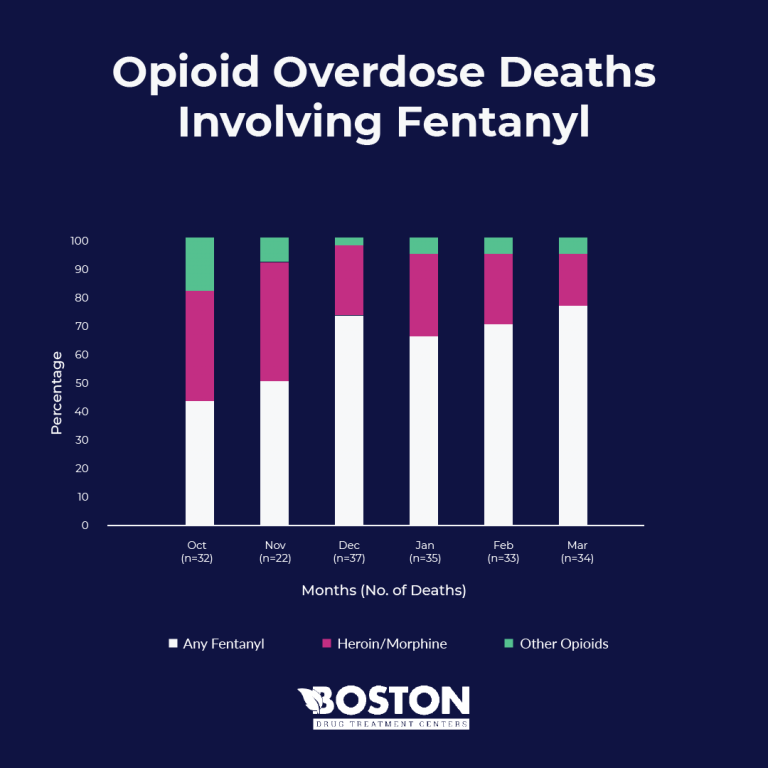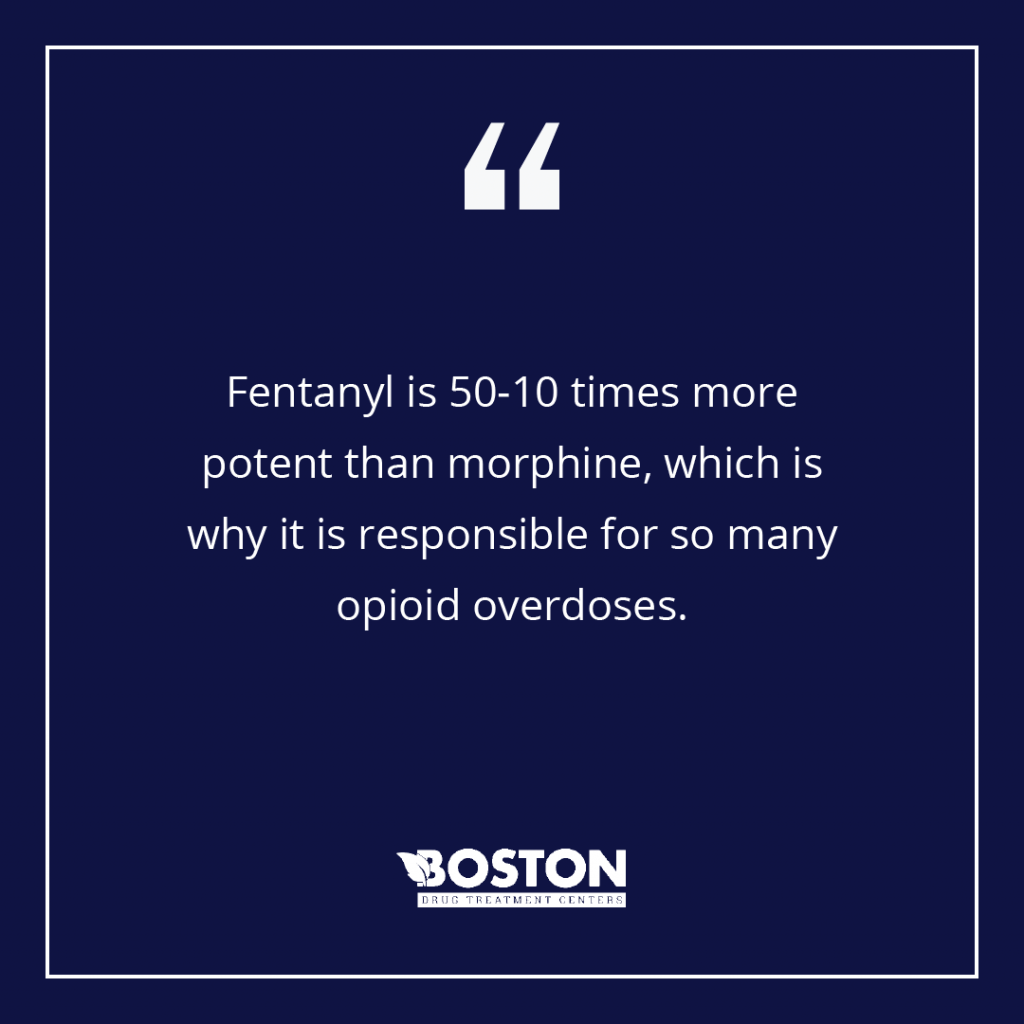Fentanyl Addiction in Boston, MA
Massachusetts, much like the rest of the United States is in an opioid crisis—led by fentanyl. The opioid crisis began about twenty years ago when doctors began overprescribing opioid painkillers and then it shifted to heroin. Now, fentanyl is contributing to the next wave of the opioid crisis. Unfortunately, this synthetic opioid also one of the deadliest drugs—in fact, just 2 milligrams of fentanyl can lead to overdose and death.1 In Massachusetts, fentanyl accounts for about two-thirds of opioid overdose deaths.2

Many dealers will cut their drugs with fentanyl, unbeknownst to the user, which can lead to accidental overdose. While some people accidentally misuse fentanyl, others intentionally misuse it for its relaxing and pleasurable effects—especially if they are tolerant to other opioids. Chronic fentanyl abuse can lead to addiction, a pattern of compulsive fentanyl use despite negative effects on your life.
If you or a loved one is showing signs of fentanyl addiction, call Boston Drug Treatment Centers at (857) 577-8193 to find a treatment program specializing in fentanyl addiction treatment and rehab.
What is Fentanyl?
Fentanyl is a synthetic opioid that has a similar chemical makeup as morphine, except it is 50-100 times more potent than morphine.1,3 Because it is more potent than other opioids, doctors often prescribe it to patients whose pain is too severe to be managed by other opioid medications, such as tramadol, Vicodin, or OxyContin.
Some brands of prescription fentanyl include:3
- Actiq
- Duragesic
- Sublimaze

Medical fentanyl comes as a shot, patch, or lozenges. Many people abuse fentanyl, either by diverting a prescription or by buying illicit fentanyl sold on the street, which is typically made in labs and sold as a powder, dropped on blotter paper, put in nasal sprays or eye droppers, or made into pills intended to resemble other opioid painkillers.3
Illegal fentanyl is often mixed with other drugs because the synthetic drug is more powerful and takes less to achieve the same high. This means that it is also cheaper, and the dealers are able to increase profits. Those who buy drugs like cocaine don’t often know the dealer added fentanyl, increasing the risk of overdose.3,4
Some common drugs that sellers cut fentanyl with are:3
- Methamphetamine
- MDMA
- Heroin
- Cocaine
Signs of a Fentanyl Addiction
Chronic fentanyl abuse can lead to severe physiological dependence, withdrawal, tolerance, and fentanyl addiction. Once you are addicted to fentanyl, you may struggle to quit or control your use in spite of the negative impact it has on several areas of your life, such as work, home, or school.
According to the Diagnostic and Statistical Manual of Mental Disorders, Fifth Edition (DSM-5), you may have a fentanyl addiction if you exhibit three or more of the following signs:5
- Taking higher or more frequent doses of fentanyl than originally intended
- Wanting to cut back on using fentanyl but failing to do so
- Spending large amounts of time trying to obtain, use, and recover from fentanyl use
- Experiencing intense cravings for fentanyl
- Using fentanyl prevents you from fulfilling other obligations
- Continuing to use fentanyl even if you notice personal or social problems because of use
- Giving up activities and social engagements in favor of fentanyl use
- Using fentanyl repeatedly in hazardous situations
- Using fentanyl despite knowing it caused or worsened a mental or physical problem
- Developing tolerance, which is a need to take more fentanyl to achieve the same effects
- Experiencing withdrawal symptoms when you abruptly quit using fentanyl
Medical and substance abuse professionals use these signs to diagnose the severity of your fentanyl addiction as either mild, moderate, or severe. A mild diagnosis means you are exhibiting two or three symptoms of addiction within one year. A moderate diagnosis is when you experience four or five of the symptoms. If you show signs of six or more of the symptoms, then you may have a severe fentanyl addiction.
Fentanyl Withdrawal Symptoms
When you are dependent on fentanyl and suddenly stop using it or reduce your dose, you will likely experience fentanyl withdrawal symptoms. Stopping the use of the drug could be because you want to quit, or you can’t obtain the drug. Either way, it can have life-threatening results if health professionals don’t monitor your withdrawal.
Some of the early withdrawal symptoms of fentanyl include:6
- Agitation
- Anxiety
- Muscle aches
- Increased tearing
- Insomnia
- Runny nose
- Sweating
- Yawning
If you don’t receive detox treatment, your fentanyl withdrawal symptoms with gradually worsen. Here are some of the later withdrawal symptoms:6
- Abdominal cramping
- Diarrhea
- Dilated pupils
- Goosebumps
- Nausea
- Vomiting
Fentanyl withdrawal can be extremely unpleasant and distressing—so much so that you may return to fentanyl or opioid use in order to alleviate these symptoms. This can be make it difficult to quit without professional detox and medical care.
Opioid Detox Services
Given how many effective medical detox programs there are in the Greater Boston area, there’s no reason to go through fentanyl withdrawal alone. A medical detox program can help you by offering the following interventions:
- Opioid detox medications, such as methadone or buprenorphine
- Symptomatic medications
- Supportive medical care, such as IV fluids
- Around-the-clock monitoring and supervision to prevent and address any complications
- Emotional support throughout the process
If you are concerned that you or a loved one is addicted to fentanyl, don’t hesitate to reach out for help. Call our helpline at (857) 577-8193 and make the first step toward recovery.
Treatment for Fentanyl Addiction
Treatment programs for fentanyl offer a variety of therapies and interventions personalized to your specific needs. All the staff you meet at treatment centers have one goal – to end the cycle of fentanyl abuse and teach you how to live a substance-free life. Treatment for fentanyl addiction typically occurs in one of two settings, inpatient or outpatient. Each treatment setting has its advantages and disadvantages, and ultimately, the best rehab for you will depend on your personal needs and preferences.
Inpatient Rehab
Inpatient care is best for those who have a severe fentanyl addiction. You live at the treatment facility for the duration of your rehab program, which may range from 30 to 90 days, although you may stay longer if necessary. Inpatient fentanyl treatment is a great option if you want to escape your everyday using environment, free from stressors and triggers, so you can focus solely on your recovery. These programs vary in treatment philosophy, with some offering upscale amenities and features like gourmet meals and massage services and others utilizing a holistic, whole-person approach to recovery.
Outpatient Rehab
Outpatient addiction treatment is a solid option if you want little disruption to your daily life, especially if you have a mild fentanyl addiction. You attend therapy and counseling sessions at an outpatient facility during the day and return home in the evening. These programs range in intensity, with standard outpatient programs requiring just a couple of hours of treatment per week and intensive outpatient and partial hospitalization programs requiring a commitment of several hours per day, all or most days of the week.
Dual Diagnosis
Dual diagnosis refers to the presence of a fentanyl addiction and co-occurring mental health disorder. These co-occurring disorders require integrated substance abuse and psychiatric treatment that fully addresses both conditions, as well as how they affect one another.
Here are some mental health disorders that commonly co-occur with fentanyl addiction:7
- Generalized anxiety disorder
- Panic disorder
- Post-traumatic stress disorder (PTSD)
- Bipolar disorder
- Depression
- Attention-deficit hyperactivity disorder (ADHD)
- Borderline personality disorder
- Antisocial personality disorder
- Schizophrenia
Dual diagnoses are also common in people with vulnerable genes or early trauma. Stress is another leading contributor to both fentanyl addiction and mental health issues.7 When someone experiences stress, mental health issues, or trauma, they may use fentanyl or other drugs to self-medicate these troubling symptoms. Chronic self-medication with fentanyl can lead to a dependence and addiction.
Thankfully no one needs to deal with these struggles alone. Many dual diagnosis treatment facilities are available in the Greater Boston area. These programs specialize in treating the unique challenges that co-occurring disorders may present.
Find a Boston Rehab
Help for your fentanyl addiction is just a phone call away. You can get the treatment and support you need to live the best version of your life.
Call our helpline at (857) 577-8193 to speak to a recovery support specialist who can help you find the best fentanyl addiction rehab program for you.
Fentanyl Resources
- U.S. Government Publishing Office. (2017). Fentanyl: The Next Wave of the Opioid Crisis.
- 2. Somerville NJ, O’Donnell J, Gladden RM, et al. (2017). Characteristics of Fentanyl Overdose — Massachusetts, 2014–2016. Morbidity and Mortality Weekly Report 66(14), 382-386.
- National Institute on Drug Abuse. (2021). Fentanyl DrugFacts.
- Centers for Disease Control and Prevention, (2021). Fentanyl Facts.
- National Institute on Drug Abuse. (2018). The Science of Drug Use and Addiction: The Basics.
- U.S. National Library of Medicine. (2020). Opiate and Opioid Withdrawal. MedlinePlus.
- National Institute on Drug Abuse. (2020). Common Comorbidities with Substance Use Disorders Research Report.
Sarah Damron is a freelance content marketing writer, expert writer with Express Writers, and mom of two sassy daughters. She has over six years of experience creating online content, mainly in the marketing and medical fields.
